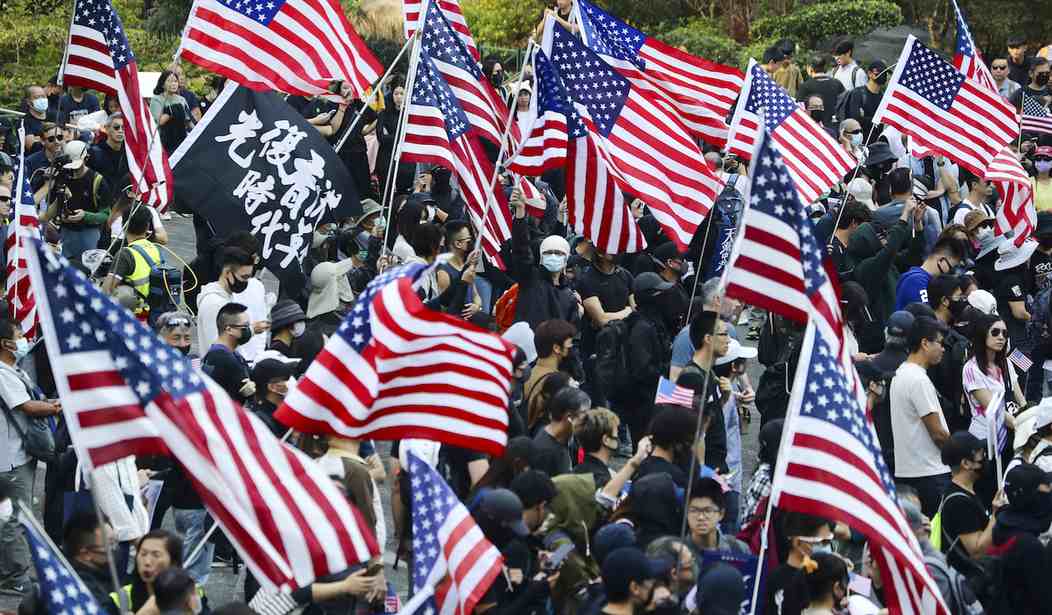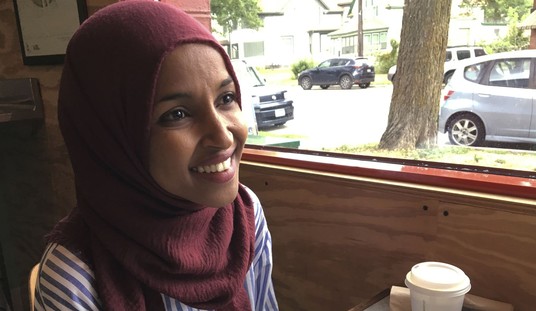I heard the term "democracy privilege" yesterday when I saw a journalist use it on X, and I think it's the perfect phrase to describe a growing number of people in the United States — the ones who think that our country is soooooo terrible, for no other reason than because Donald Trump is president.
We see it everywhere: at "No Kings" protests (the name in itself betrays the stupidity of it all); when Democratic senators — minus John Fetterman — vote along party lines on issues that should be common sense, like paying the military or stopping cartels from flooding our country with drugs and crime; and when loudmouth celebrities talk about how they just can't handle this country anymore and spend less time in their million-dollar California mansions and more in their million-dollar mansions in Ireland or Italy, like they're making some major sacrifice to get away from Trump. Oh, spare me.
You may have seen this video floating around social media over the last day or two of a progressive woman type who claims she fled the U.S. because, well, Trump, and moved to a "third-world country." Now, she has some regrets. (By the way, I've spent half the morning trying to figure out who this woman is with no luck. The video appears to be authentic, though you never know these days, but I think it's worth exploring anyway — I've seen other people expressing similar sentiments in the recent past.)
She begins:
If you're an American who is considering leaving the country to move somewhere else, make sure that the location you choose isn't based off of fear and lack mentality. I regret moving to Costa Rica. It's a beautiful country. I love the nature and wildlife. But moving to a third-world country where I don't know the language, I don't have any connections, resources, or opportunities, that didn't make my life any easier, by any means.
I was just so scared of what's going on in America politically that I was in fight-or-flight. I was like, 'How am I gonna afford to survive? Like, how am I gonna find a place to live?' Like, I was freaking out, and then I came here and made my life so much harder.
And now, I'm trying to go back, and I just wish I didn't leave in the first place. And it's so weird to want to move to America right now with everything that's going on. But I just left so many privileges and resources behind, and I want them back.
She goes on to talk about how, even though her parents split when she was a child and she ended up in low-income housing, she still had a lot of privilege simply by living in the United States. She also talks about how when she was younger, she traveled with friends to various places, including Costa Rica, and always stayed in fancy resorts, but she's learned that this is not reality. Here's the video if you want to watch the whole speech:
Liberal woman FLED ‘Donald Trump’s America’, and accidentally moved to a 3rd world country — now she wants to move back.
— American AF 🇺🇸 (@iAnonPatriot) October 16, 2025
PLEASE DON’T COME BACK. pic.twitter.com/39OgUDdUn2
First of all, I want to defend my lovely Costa Rica a little bit — if she had to pick a "third-world country" to move to, that's probably the easiest. Most of the people there speak Spanish and at least some English. Most businesses take U.S. dollars. There's a huge expat community there already, and it's a very pro-U.S. country with a great diplomatic relationship, so you do have resources. Lots of them.
I've admitted before that I have toyed with the idea of moving to Costa Rica myself — for personal reasons, not because any one man is or isn't president. And I still see myself having a home there one day in the not-too-distant future. But my plan has never been to just up and leave the U.S. and hope for the best.
I started by joining the expat groups on Facebook. I've been back and forth between here and there so many times over the last few years, and every time I make a point to explore more of the country and meet people and form connections. I also actually live like the locals, which means no fancy resorts. I work while I'm there. I buy groceries. I stay in houses. I've also met up with a woman who moved there a decade ago and now runs a successful business helping other people who want to live there, and I will work with her if I do ever make that move.
But as I like to remind people, the U.S. is not the world, and the world is not the U.S. Other countries may look appealing, but you will never find the freedoms and advantages you have here anywhere else on this planet. While I can only speak to Costa Rica, there are privileges you will lose even there, ranging from the trivial to those that may have a bigger impact on your life. The power goes out. The showers aren't always hot. There are no same-day Amazon deliveries — more like wait two or three weeks and pay $15 extra for that $10 item.
There's no running to Chick-fil-A or McDonald's when you need a quick bite to eat unless you live in very specific places. There's a saying, "Tico time," which means that the guy you hired to paint your house may not show up until days after he said he would. Many people have a gated driveway or bars around their homes to keep thieves at bay. To be honest, some of these items on the list are the reasons why I like it there so much — most days, I'd gladly trade Amazon for a beautiful beach and a more laid-back culture — but that's my own privilege showing. I actually have a choice in that I can go back and forth and make a decision as to what kind of luxuries I want access to. And I recognize that.
People who live in many other countries don't always have that opportunity. As a matter of fact, based on my own time spent in Latin America, I've found that many people who live there recognize the privileges we have here in the U.S. better than any of us do. Many of them talk about our nation as if it's the greatest place in the world, a country that only exists in their dreams. That's one reason so many try to come here illegally.
It's why over 7 million Venezuelans have fled their own country. They live under a dictator who has driven the country into the ground, wrecking its economy, threatening people arbitrarily, and keeping tabs on their loyalty to the point that it impacts whether or not they can have food.
I have been covering the crisis in Venezuela for months, but the mainstream media seems to have just discovered it this week, mostly because the one woman who is not afraid and stands up to that dictator and is ready to restore democracy and Western values to a country on its knees won a Nobel Peace Prize. She dedicated that prize to Trump because she knows that at this point, he's the one who can and is willing to help her take her country back, and once she does, she wants to make the U.S. a major ally, something that would benefit both nations tremendously.
This should be a fight that every single one of us in this country supports, whether you agree with U.S. intervention or not. A country that has been stuck with socialism for the last few decades finally has a shot at freedom, to get out from under tyranny and return to the booming democracy it once was.
But that's not the case. Earlier this week, NPR published an article on that woman, Maria Corina Machado, calling her the "far-right leader of Venezuela's opposition." Why? Because she aligned herself with Trump. And we all know that "far-right" is MSM speak for "Nazi" or something similarly asinine.
Venezuelan-American journalist Germania Rodriguez Poleo — the person from whom I got the "democracy privilege" line — made an excellent point:
Many who are blinded by their Democracy Privilege judge Maria Corina for allying herself with Trump. They won’t support Venezuelan democracy because hating Trump matters more. The fact that a liberal institution like NPR calls Machado 'far-right' is an example why she and Venezuelans have had no other choice of ally. It also shows why the term 'far-right' has lost all its meaning why the actual extremes continue advancing. It’s negligent. journalism.
This x 1,000. I can’t even count how often someone in the U.S. says to me that Trump is the dictator for pressuring Maduro. “Democracy Privilege” is what’s wrong with half the U.S. https://t.co/nYa62GgjW1
— SarahDownSouth (@SarahDownSouth) October 16, 2025
Ms. Rodriguez Poleo is not wrong. Since I began covering Venezuela, I've received several nasty responses from liberals in the U.S. telling me how ironic it is that so many people want Trump to help take out a dictator when he is, in fact, a dictator himself. I want to scream, "Do you hear yourself, Martha? The fact that these people are even able to get on social media or leave comments on websites calling Trump a dictator means he is not a dictator!"
In the United States, you can march about and act like a fool, screaming, "No Kings." In Venezuela, you have to sign up for a digital platform that allows the government to keep tabs on your health, voting status, and financial situation, and if you don't, you don't get your pension, or if it shows you vote a certain way, you don't eat. If you protest, you go to jail or disappear.
Running off to another country because you don't like the president or calling a woman who is trying to save a country "far-right" because she has a good diplomatic relationship with Trump — that's not brave, it's privilege. We can argue policy all day long, but far too many people in this country confuse discomfort with oppression. That alone should tell them how good they have it.










